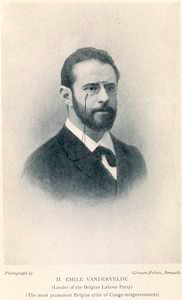Émile Vandervelde

Émile Vandervelde (born January 25, 1866 in Ixelles / Elsene ; † December 27, 1938 ibid) was a Belgian social democrat , university professor, politician and chairman of the Second International .
Life
Émile Vandervelde graduated from the Free University of Brussels in 1885 with a degree in law and in 1886 joined the Belgian Workers' Party (POB), in 1888 he successfully completed his studies in social sciences . In 1894 he became a social democratic member of the Belgian parliament . In 1900 he took over the chairmanship of the Second International , which he held until its dissolution in the First World War . He worked as a professor at the Free University of Brussels.
During the First World War, Vandervelde was portrayed by the German press as a “Romance” and anti-German internationalist, while his counterpart was the Flemish cooperative politician Edward Anseele . While Vandervelde, as the (former) president of the office of the Second International, condemned the German occupation of Belgium in World War I , Anseele tried to mediate contacts with the German SPD. The portrayal of the opposing pair Vandervelde-Anseele in the German war propaganda suggested, however, that the Flemish-Belgian population was friendly to German, which did not correspond to the facts, but rather arose from a folk fantasy of the supposedly “related” Flemings.
From 1916 to 1917 Vandervelde was Minister without Portfolio , from 1917 to 1918 Minister of War, from 1918 to 1921 Minister of Justice, from 1925 to 1927 Minister of Foreign Affairs and from 1936 to 1937 Minister of Health. As Minister of Justice, he ensured that Parliament passed the so-called "Vandervelde Law" ( loi Vandervelde ) on August 29, 1919 , which was supposed to prevent alcoholism . It banned the sale of liquor in bars, creating a demand for beer with a higher alcohol content .
He took over the chairmanship of the Parti Ouvrier Belge in 1928 and kept it until his death in 1938.
Vandervelde was a member of the Brussels Masonic Lodge Les Amis Philanthropes from February 20, 1899 .
Fonts
- Les associations professionelles d'artisans et d'ouvriers en Belgique (1892).
- L'Evolutionindustrie et le collectivisme (1896); English: Collectivism and Industrial Evolution (1901).
- Le question agraire en Belgique (1897).
- Le Socialisme en Belgique (1898), with Jules Destreé .
- L'Alcoolisme et les conditions du travail en Belgique (1899).
- Le propriété foncière en Belgique (1900).
- L'Exode rural et le retour aux champs (1903).
- Le Socialisme et l'agriculture (1906).
- Le Belgique et le Congo (1911).
- Le pays d'Israel: un marxiste en Palestine (1929) ( sammlungen.ub.uni-frankfurt.de ); German: Creating Palestine: The Jewish Construction Today and Tomorrow (1930).
literature
- Janet Polasky: The democratic socialism of Emile Vandervelde. Between reform and revolution . Berg, Oxford 1995, ISBN 0-85496-394-4 .
- Sebastian Bischoff: Good comrade, Swiss enemy. The SPD, the International and the personification of the “Belgian danger” in the First World War , in: Arbeit - Bewegungs - Geschichte , Issue I / 2018, pp. 9-27.
Web links
- Emile Vandervelde
- Emile Vandervelde
- Institute Emile Vandervelde
- Newspaper article about Émile Vandervelde in the press kit 20th Century of the ZBW - Leibniz Information Center for Economics .
Individual evidence
- ↑ Sebastian Bischoff: Good comrade, welscher enemy. The SPD, the International and the personification of the “Belgian danger” in the First World War , in: Arbeit - Bewegungs - Geschichte , Issue I / 2018, pp. 9-27.
- ↑ Janet Polasky: The democratic socialism of Emile Vandervelde. Between reform and revolution . Berg, Oxford 1995, p. 165.
- ↑ Eugen Lennhoff, Oskar Posner, Dieter A. Binder : Internationales Freemaurer Lexikon . 5th edition 2006, Herbig Verlag, ISBN 978-3-7766-2478-6 , p. 867.
| personal data | |
|---|---|
| SURNAME | Vandervelde, Émile |
| BRIEF DESCRIPTION | Belgian social democrat, university professor, politician |
| DATE OF BIRTH | January 25, 1866 |
| PLACE OF BIRTH | Ixelles / Elsene |
| DATE OF DEATH | December 27, 1938 |
| Place of death | Ixelles / Elsene |
